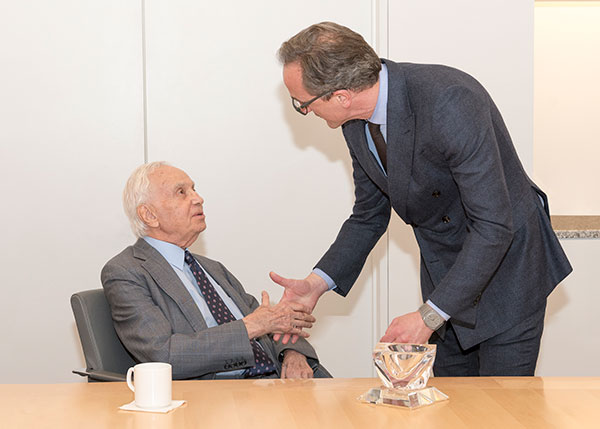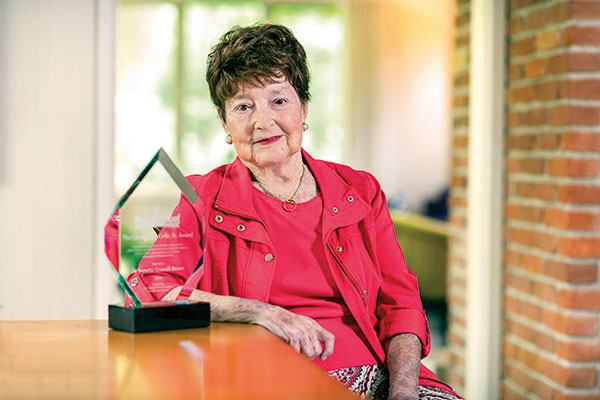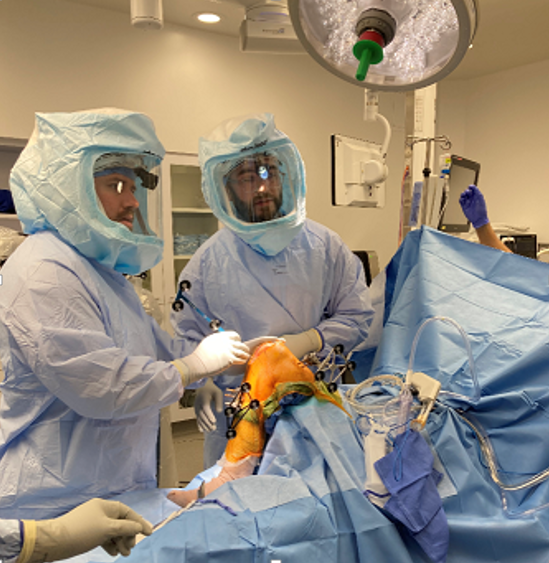Foundation Gift Honors the Legacy of Morton Mandel

Cleveland businessman and philanthropist Morton Mandel, who passed away in 2019 at the age of 98, was well-known for his interest in innovation and providing support to leaders to foster new ideas, as well as his belief that strong leaders who are lifelong learners drive organizational growth and societal change.
To honor his legacy, the Jack, Joseph and Morton Mandel Foundation has made a gift of $30 million to Cleveland Clinic that will have significant impact on leadership and innovation for years to come. The gift will endow the position of Cleveland Clinic’s CEO and establish an endowed fund for innovation.
“Providing outstanding medical care, developing innovative ideas and training the leaders of the future are three elements at Cleveland Clinic that were extremely important to Mort and remain extremely important to the Foundation,” says Jehuda Reinharz, PhD, President and CEO of the Jack, Joseph and Morton Mandel Foundation. “We feel this gift will continue to support those efforts at Cleveland Clinic.”
Advancing Priorities
Mr. Mandel’s name will be associated with the CEO of Cleveland Clinic, which is consistently ranked as a top hospital in U.S. News & World Report’s annual “America’s Best Hospitals” survey. The inaugural holder of the endowed position is the current Cleveland Clinic CEO and President, Tom Mihaljevic, MD. The gift is intended to recognize the friendships Mr. Mandel had with Dr. Mihaljevic and his predecessor, Toby Cosgrove, MD.
“We are deeply appreciative of this latest gift from the Jack, Joseph and Morton Mandel Foundation,” says Dr. Mihaljevic. “Mort was an innovative leader, generous philanthropist and dear friend who left an incredible legacy at Cleveland Clinic and beyond. I am humbled and honored to be the inaugural holder of the Morton L. Mandel CEO Chair.”
Funds drawn annually from the Morton L. Mandel Innovation Fund endowment will be available to the CEO to help develop innovative ideas that impact the communities served by Cleveland Clinic. Funds will help support the CEO’s vision and advance priorities important to that vision.
“This gift gives a tool to the CEO of Cleveland Clinic to be able to spark innovation. We think that's a big part of leadership,” says Stephen H. Hoffman, Chairman of the Board of the Jack, Joseph and Morton Mandel Foundation. “We're giving the CEO a new resource to put muscle behind his or her leadership in innovation, now and in the future.”
Previous gifts from the Mandel Foundation during the leadership tenures of Dr. Mihaljevic and Dr. Cosgrove include funds directed to Cleveland Clinic’s urology department and a $23M gift to the Global Leadership and Learning Institute, now named for Jack, Joseph and Morton Mandel.
Learn more about Mr. Mandel’s thoughts on leadership and philanthropy in this interview published in the Winter 2020 issue of Cleveland Clinic Magazine.
2022 Crile Award Winner Focuses on Neurological Research

Patent holder. Author of nine books. Trailblazing chemist. Recipient of 13 honorary degrees, including an honorary doctorate. Member of six corporate boards.
Jeanette “Jenny” Grasselli Brown, 94, has lived a remarkable life. The daughter of Hungarian immigrants who settled in Cleveland, she studied chemistry at Ohio University, was hired by Standard Oil Co. research and development in the 1950s and rose to become the first female in top management in R & D at thenBP America Inc. She is widely recognized as one of the 20th century’s greatest contributors to infrared and Raman spectroscopy. But Dr. Brown has never rested on her laurels. She had the opportunity to recognize her potential, but she was not satisfied unless she could help others do the same.
Starting a Movement
At Cleveland Clinic’s Mellen Center for Multiple Sclerosis, Dr. Brown is a philanthropic giant.
She first became involved with MS research and philanthropy when her childhood friend Rosemary was diagnosed with the condition at the age of 18. The same knack for problem-solving that propelled Dr. Brown to the top of her field also pushed her to discover new ways to improve her friend’s quality of life.
She found her answer when she connected with Richard Rudick, MD, the former Director of the Mellen Center at Cleveland Clinic. By making a significant donation to support patient and family care, she not only contributed to Rosemary’s care, but also spread generosity to countless patients who came after her.
Robert Bermel, MD, the current Director of Cleveland Clinic Mellen Center, views Dr. Brown as one of the center’s greatest champions. “She is an extremely reassuring person, the kind of person who makes you feel like anything is possible,” he says. “She not only made a personal financial gift, but also attracted more people and energy to the cause at a critical time in the development of new research and treatment for MS.”
Dr. Brown became the head of the center’s steering committee, which created a women’s committee that played a pivotal role in raising funds to formally establish the Cleveland Clinic Mellen Center in 1985. “Jenny and the members of the women’s committee created a movement, not just a fundraising effort,” says Dr. Bermel. “They did everything from buttoned-up conversations with major donors to rib cookouts and carnivals.”
Janet Perryman, a Cleveland Clinic administrator who worked with the women’s committee, calls Dr. Brown a “brilliant, lovely person” who leads with enthusiasm and resolve. “When something is important to Jenny, she is 100% on board,” says Perryman.
Thanks in large part to the group of volunteers Dr. Brown organized, the Cleveland Clinic Mellen Center has emerged as a global leader in multidisciplinary care for patients with MS and other chronic diseases. “The Mellen Center is about 10 years ahead of any similar center in the country,” says Perryman, “and Jenny is a major reason for that.”
Leaving a Mark
The 2022 George W. Crile Sr. Award honors Dr. Brown for her exceptional service to Cleveland Clinic Mellen Center, as well as her continued dedication to Cleveland Clinic as a member of the Board of Trustees. Dr. Brown expresses gratitude for receiving an award named for one of the forerunners of medical research.
“The Crile Award is clearly a symbol of the kind of excellence you find at Cleveland Clinic,” she says. “Dr. Crile knew that without robust research programs, patient care would not be all that it could be.” Leading-edge research has taken on new importance for Dr. Brown. She and her late husband, Dr. Glenn Brown, were diagnosed with Parkinson’s disease only two years apart. She remains hopeful that initiatives like the Cleveland Clinic Brain Study will change the prognosis for patients like them and expresses interest in expanding the scope of her philanthropy.
Learn more about Dr. Brown and the Crile Award in this video.
First Robotic Procedure at Coral Springs Ambulatory Surgery Center

Millions of Americans suffer from knee pain caused by arthritis or an injury. When noninvasive methods of treatment, such as medication and physical therapy, fail to provide adequate relief, physicians often recommend orthopaedic surgery, including robotic surgery.
“Robotic procedures provide a level of improved accuracy and precision, and offer each patient a personalized surgical experience based on their diagnosis and anatomy,” says Preston Grieco, MD.
In July 2022, Cleveland Clinic Weston’s Coral Springs Ambulatory Surgery Center achieved a milestone with the addition of robotic procedures for total joint replacements. Dr. Grieco performed the first robotically assisted Mako partial and total knee replacement at Coral Springs.
Innovative techniques, such as Mako, have been associated with a reduced impact on bone and soft tissue, as noted in clinical studies. Many knee replacement recipients experience significant improvement in pain, stiffness, and function of their replaced joint.
How Mako Technology Works
The first step prior to surgery is to create a patient-specific surgical plan. A CT scan of the knee is taken to develop a 3D virtual model of the unique joint. The physician uses this model to evaluate bone structure, disease severity, and joint alignment, so they can determine the optimal size, placement and alignment of the implant.
In the operating room, the surgeon guides Mako’s robotic arm to remove or partially remove bone and cartilage from the knee. A virtual boundary provides tactile resistance to help the surgeon stay within the boundaries defined in the surgical plan. With the diseased bone gone, the implant is placed into the knee joint. Then the patient is brought to the recovery room to begin the journey to strengthening the new joint.
The Coral Springs Ambulatory Surgery Center is a 73,000 square-foot facility that offers a wide range of specialty care and ambulatory surgical services in a leading-edge, modern environment. Easily accessible from the Sawgrass Expressway, the center includes 24 prep and recover bays, four operating rooms, two endoscopy suites, surgical and imaging services, an Express Care Clinic and more.
“Coral Springs offers a smaller facility that’s easy to navigate with convenient parking and the ability for patients to either go home the same day of their surgery or spend a night if necessary,” says Carlos A. Higuera-Rueda, MD, FAAOS, Chair of Orthopaedic Surgery.
The addition of orthopaedic robotic procedures at the Coral Springs Ambulatory Surgery Center expands access to innovative care for residents in Coral Springs, north Broward and southern Palm Beach County, and continues to improve our patients’ experiences and outcomes in surrounding communities.
Mercy Hospital Fundraiser Benefits Breast Health Screenings

A unique fundraiser is having a big impact on breast cancer services at Cleveland Clinic Mercy Hospital.
For the third consecutive year, Paddle for Pink was held at Lake Mohawk in Carroll County, Ohio. More than 100 participants paddled a variety of kayaks, boards and other watercraft around the lake for three hours, raising $25,000 to help uninsured or underinsured patients with breast cancer or those needing breast cancer screenings.
Nicole Haines, RN, Director of the Cancer Center at Mercy Hospital, says Lake Mohawk resident Kim Frantz, who organizes Paddle for Pink every year, does a wonderful job. “I want people who give to know that it's very important to us and that we use the funds judiciously and well.”
Speeding the Diagnosis
While initial breast cancer screenings may be covered by insurance, often additional testing is not. “For example, if something abnormal is found and a woman is underinsured or has a high copay or deductible, she may be hesitant to follow up with additional testing because it’s not covered,” says Nicole. “And that's where funds like this can be a huge help because they're dedicated specifically to helping with the costs of breast health.”
Paddle for Pink funds also may be used to purchase prosthetics, bras, lymphedema sleeves and even transportation to appointments.
Nicole emphasizes that the funds encourage uninsured or underinsured women to move forward with testing. “It buys us time to get patients enrolled in assistance programs without delaying a diagnosis. Programs exist to help with some prescription drug costs, but the copays and transportation costs may be overwhelming for many patients.”
Helping to Care for the Whole Patient
Cancer treatment is expensive, she notes. “I think people don't realize that most everyone is one serious illness away from financial tragedy,” says Nicole. “When you're healthy and doing well, you don't think about how quickly that can change. And that's especially true of cancer because it affects every aspect of your life.”
Nicole gives an example of patient who may be unable to do her job because her arm is swollen due to her breast cancer treatment – a common side effect. She can’t afford a lymphedema sleeve but her family needs the income from her job to pay for food and rent.
“Philanthropic funds provide us the opportunity to take care of the whole patient,” she says. “They support our ability to help with some of the very practical needs that come between a patient and essential care that prolongs life, cures their disease or improves their quality of life.”
Curious about hosting a community fundraising event to support your regional Cleveland Clinic hospital? Learn more here.

